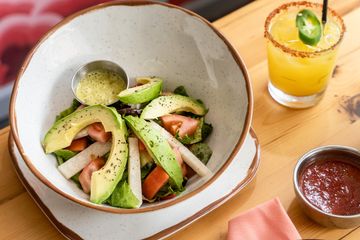Explore how New York Times rated dining spots a must-visit
Is Mexican Food Healthy And Balanced? Unboxing the Nutritional Conveniences of Standard Components
The question of whether Mexican food is healthy welcomes an expedition of its conventional components. Beans and corn act as fundamental staples, rich in protein and fiber. Avocados provide valuable fats, while different natural herbs and spices include taste and wellness advantages - happy hour. Together, these parts produce a tapestry of nourishment. Nevertheless, the healthiness of Mexican food frequently relies on preparation techniques and portion sizes. What function do these factors play in identifying its total nutritional value?
The Power of Beans: Protein and Fiber-Rich Staples
Often ignored, beans serve as a keystone of Mexican food, providing a wide range of dietary benefits. Rich in protein, they are an exceptional plant-based option for those seeking to fulfill their nutritional healthy protein requires. This high healthy protein content sustains muscle mass fixing and growth, making beans important for both vegetarians and meat-eaters alike. Additionally, beans are a remarkable resource of dietary fiber, which aids in food digestion and promotes a feeling of fullness, possibly assisting with weight administration.
The variety of beans made use of in Mexican meals, such as black beans, pinto beans, and kidney beans, adds to a varied taste profile and can improve meals nutritionally. Moreover, beans are low in fat and include important minerals and vitamins, consisting of magnesium, iron, and folate. With each other, these features make beans an essential active ingredient, supplying both nutrients and sustenance in conventional Mexican price.

Corn: a Versatile Grain With Nutritional Perks
Corn stands out as a flexible grain essential to Mexican food, celebrated not only for its culinary applications yet also for its remarkable nutritional account. As a main active ingredient in dishes like tortillas, tamales, and pozole, corn offers essential nutrients that contribute to a well balanced diet plan. Rich in carbohydrates, it serves as a significant energy source, while additionally being low in fat, making it a favorable alternative for numerous dietary needs.
Corn is a good source of dietary fiber, which assists in digestion and advertises satiation. It includes significant amounts of vitamins such as B-complex vitamins, which are essential for power metabolic rate. The presence of antioxidants, especially carotenoids, contributes to overall health by minimizing oxidative stress. Additionally, corn is gluten-free, accommodating those with gluten sensitivities. In general, the dietary advantages of corn highlight its relevance in typical Mexican food and its function in a healthy and balanced diet plan.
Avocados: Healthy Fats and Nutrients in Every Bite
Avocados play a significant duty in Mexican cuisine, complementing dishes with their creamy texture and rich flavor. Beyond their culinary charm, avocados are commemorated for their excellent nutritional account. They are an abundant resource of healthy and balanced monounsaturated fats, which can help reduced negative cholesterol levels and support heart wellness. Furthermore, avocados are packed with necessary vitamins and minerals, consisting of potassium, vitamin E, and B vitamins, contributing to total health.
The high fiber web content in avocados aids digestion and promotes satiety, making them an advantageous addition to any kind of dish. Their special nutrient composition can additionally support skin wellness and provide anti-inflammatory advantages. Including avocados into typical Mexican meals or enjoying them as a standalone snack can boost both taste and nutrition, demonstrating why they are a precious staple in Mexican food. Overall, avocados provide a delicious means to appreciate healthy and balanced fats and important nutrients in every bite.

Herbs and spices: Flavorful Health Boosters
While appreciating the rich flavors of Mexican cuisine, one can not ignore the necessary function that spices and herbs play in improving both taste and health. Components such as oregano, cilantro, and chili peppers not just add to the dynamic flavor account but additionally supply considerable wellness advantages. Cilantro is understood for its purifying homes, helping to eliminate hefty metals from the body, while oregano is loaded with antioxidants and has anti-inflammatory impacts.
Chili peppers, a staple in several Mexican recipes, have capsaicin, which has been connected to boosted metabolic rate and pain alleviation. Additionally, spices like cumin and coriander support digestion and might assist other in blood sugar level guideline. Integrating these flavorful wellness boosters right into dishes not only enhances the cooking experience but likewise advertises total well-being, making Mexican food not simply tasty, however additionally nutritionally advantageous.
Standard Cooking Methods: Enhancing Nutrition and Flavor
Conventional food preparation techniques in Mexican cuisine play a necessary duty in enhancing both nutrition and taste, as they often prioritize fresh ingredients and time-honored techniques. Techniques such as nixtamalization, where corn is saturated and cooked in an alkaline solution, not just enhance the nutrient account of tortillas however additionally enhance their digestibility - lunch and dinner. Furthermore, the usage of sluggish cooking techniques, like cooking or braising, allows tastes to combine magnificently while keeping the stability of the components

Regularly Asked Questions
Are Mexican Food Portions Commonly Larger Than Other Foods?
Mexican food sections are frequently larger than those of numerous other foods. This particular mirrors typical dining methods, stressing communal sharing my blog and hearty meals, which can cause a much more substantial offering size overall.
Exactly how Does the Prep Work Method Affect Healthfulness of Mexican Food?
Prep work techniques substantially influence the healthiness of Mexican food. Techniques such as cooking or steaming maintain nutrients, while frying can increase harmful fat material. Choices of ingredients and cooking styles eventually figure out total dietary worth.
Can Mexican Food Be Customized for Certain Nutritional Constraints?
Mexican food can indeed be customized for details dietary constraints. Alternatives, such as making use of corn tortillas for gluten-free diets click for source or incorporating even more vegetables, enable individuals to take pleasure in traditional tastes while suiting various nutritional requirements.
What Prevail Misconceptions Regarding Mexican Food and Wellness?
Typical misunderstandings regarding Mexican food consist of the idea that it is inherently unhealthy, overly zesty, and entirely concentrated on fats. Actually, traditional recipes commonly feature healthy active ingredients and can be tailored to numerous nutritional needs.
Exist Much Healthier Choices at Mexican Restaurants?
Much healthier alternatives at Mexican dining establishments typically include barbequed meats, beans, and fresh veggies. Picking meals that stress entire active ingredients and preventing hefty sauces can result in an extra nutritious eating experience, advertising general wellness.
The variety of beans used in Mexican dishes, such as black beans, pinto beans, and kidney beans, adds to a varied flavor profile and can boost dishes nutritionally. Avocados play a considerable function in Mexican cuisine, enhancing meals with their creamy texture and rich flavor. Including avocados right into traditional Mexican meals or enjoying them as a standalone snack can improve both flavor and nourishment, showing why they are a cherished staple in Mexican cuisine. While delighting in the rich tastes of Mexican food, one can not ignore the vital function that spices and herbs play in boosting both taste and wellness. Typical food preparation techniques in Mexican food play a vital duty in enhancing both nourishment and flavor, as they often prioritize classic techniques and fresh ingredients.